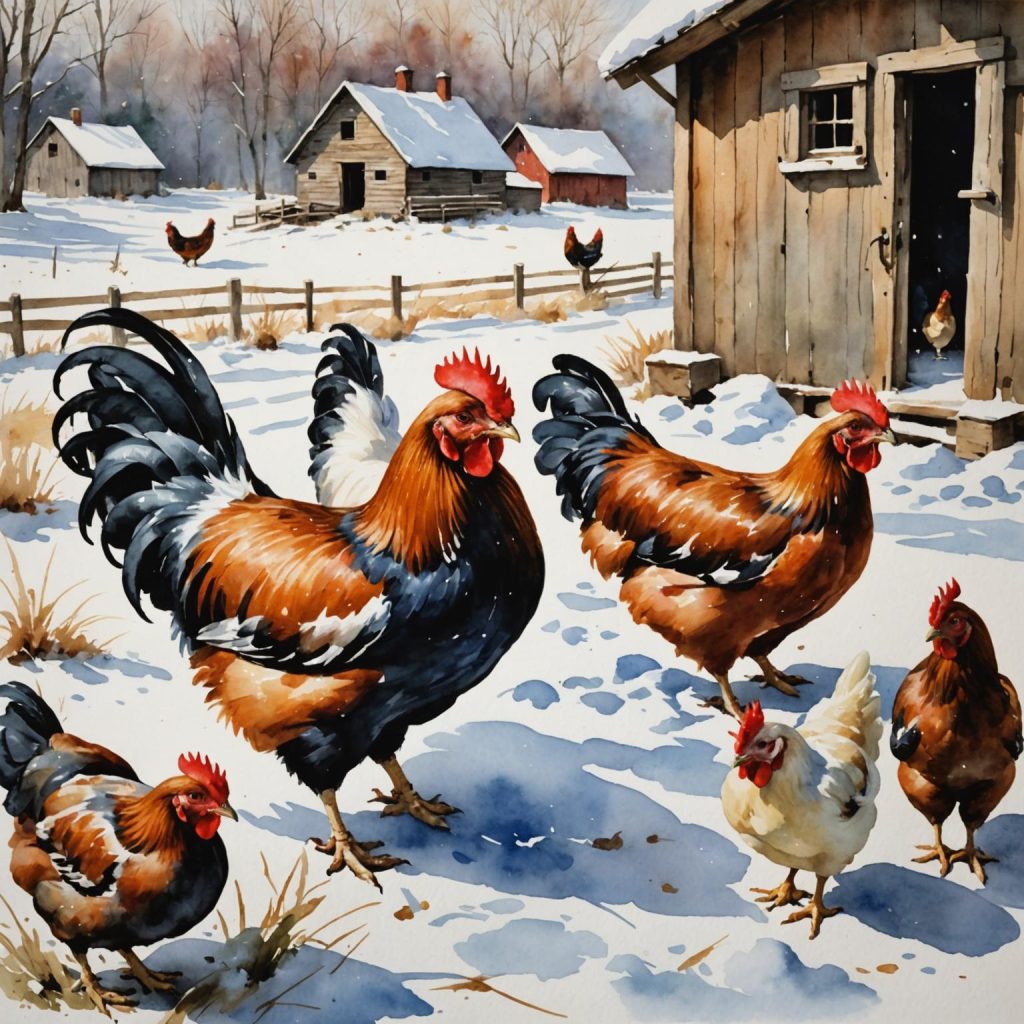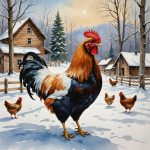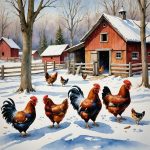Keeping chickens warm in the winter is crucial for their health and well-being. Chickens are sensitive to cold temperatures and can suffer from frostbite, hypothermia, and other cold-related health issues if not properly cared for during the winter months. Cold temperatures can also decrease egg production and affect the overall health of the flock. It is important for chicken owners to understand the signs of cold stress in chickens and take proactive measures to keep them warm and comfortable during the winter.
Chickens are naturally equipped to handle cold temperatures to some extent, as they have feathers and a layer of fat to help insulate their bodies. However, extreme cold can still be dangerous for them, especially if they are not provided with adequate shelter and warmth. It is important for chicken owners to be aware of the specific needs of their flock and take steps to ensure that they are kept warm and healthy throughout the winter season.
Table of Contents
- 1 Creating a Cozy and Insulated Chicken Coop
- 2 Providing Adequate Ventilation while Keeping Chickens Warm
- 3 Supplementing with Heat Sources
- 4 Offering Nutritious and Calorie-Dense Foods
- 5 Protecting Chickens from Frostbite and Other Cold-Related Health Issues
- 6 Monitoring and Adjusting for Changing Weather Conditions
Creating a Cozy and Insulated Chicken Coop
One of the most important steps in keeping chickens warm in winter is to provide them with a cozy and insulated chicken coop. The coop should be well-ventilated to prevent moisture buildup, but also well-insulated to retain heat. Insulating the walls, ceiling, and floor of the coop can help to maintain a comfortable temperature inside, even when it is cold outside. Adding extra bedding, such as straw or wood shavings, can also help to provide additional insulation and warmth for the chickens.
It is also important to ensure that the coop is free from drafts and leaks, as these can let in cold air and moisture, making it difficult for the chickens to stay warm. Sealing any gaps or cracks in the coop can help to keep it airtight and prevent heat from escaping. Additionally, providing a secure door that can be closed at night can help to keep the chickens safe and warm inside the coop. By creating a cozy and insulated environment for the chickens, chicken owners can help to ensure that their flock stays warm and healthy throughout the winter.
Providing Adequate Ventilation while Keeping Chickens Warm
While it is important to keep chickens warm in the winter, it is equally important to provide them with adequate ventilation. Poor ventilation can lead to a buildup of moisture and ammonia in the coop, which can be harmful to the chickens’ respiratory health. It is important to strike a balance between keeping the coop warm and ensuring that it is well-ventilated to maintain good air quality.
One way to provide ventilation while keeping chickens warm is to install adjustable vents or windows in the coop that can be opened or closed as needed. This allows chicken owners to control the airflow and temperature inside the coop, ensuring that it stays warm and dry while still allowing for fresh air to circulate. It is also important to regularly clean and maintain the coop to prevent the buildup of moisture and ammonia, which can be exacerbated by poor ventilation. By providing adequate ventilation, chicken owners can help to keep their flock healthy and comfortable throughout the winter months.
Supplementing with Heat Sources
In addition to creating a cozy and insulated coop, chicken owners may need to supplement with heat sources to keep their flock warm in winter. This is especially important for breeds that are less cold-hardy or for chickens that are particularly sensitive to cold temperatures. There are several different types of heat sources that can be used in the coop, including heat lamps, radiant heaters, and heated perches.
Heat lamps are a popular choice for providing supplemental heat in the coop, as they can be easily installed and provide a focused source of warmth. However, it is important to use caution when using heat lamps, as they can pose a fire hazard if not properly secured and monitored. Radiant heaters are another option for providing supplemental heat, as they emit infrared radiation that warms objects rather than the air. Heated perches are also available for chickens to roost on, providing warmth directly to their feet during cold nights.
It is important for chicken owners to carefully monitor the temperature inside the coop when using heat sources, as overheating can be just as dangerous as cold temperatures for chickens. Additionally, it is important to provide a backup heat source in case of power outages or other emergencies. By supplementing with heat sources when necessary, chicken owners can help to ensure that their flock stays warm and healthy throughout the winter.
Offering Nutritious and Calorie-Dense Foods
During the winter months, it is important to provide chickens with nutritious and calorie-dense foods to help them stay warm and maintain their energy levels. Cold temperatures can increase the energy requirements of chickens, as they need extra calories to stay warm and active. Providing high-quality feed that is rich in protein and fat can help to meet these increased energy needs and keep the flock healthy throughout the winter.
In addition to their regular feed, chicken owners can offer supplemental treats such as cracked corn, sunflower seeds, and mealworms to provide extra calories and nutrients. These treats can also help to keep the chickens entertained and active during the winter months when they may spend more time indoors. It is important to monitor the body condition of the flock and adjust their diet as needed to ensure that they are getting enough calories to stay warm and healthy.
It is also important to provide access to fresh water at all times, as chickens need water to regulate their body temperature and stay hydrated. In cold weather, water can freeze quickly, so it is important to regularly check and refill waterers to ensure that the flock has access to liquid water throughout the day. By offering nutritious and calorie-dense foods, as well as access to fresh water, chicken owners can help to ensure that their flock stays healthy and warm throughout the winter.
In addition to keeping chickens warm in winter, it is important to protect them from frostbite and other cold-related health issues. Frostbite occurs when the skin and tissues freeze due to exposure to cold temperatures, particularly on areas such as combs, wattles, and feet. To prevent frostbite, it is important to provide adequate shelter and warmth for the chickens, as well as protect them from drafts and moisture buildup in the coop.
One way to protect chickens from frostbite is to apply a thin layer of petroleum jelly or other protective ointment on their combs and wattles during extremely cold weather. This can help to insulate these vulnerable areas and prevent frostbite from occurring. It is also important to regularly check the flock for signs of frostbite, such as discoloration or swelling, and take proactive measures to treat affected areas if necessary.
In addition to frostbite, chickens can also suffer from other cold-related health issues such as respiratory infections and hypothermia. It is important for chicken owners to monitor their flock closely for signs of illness or distress during the winter months and seek veterinary care if needed. By taking proactive measures to protect chickens from frostbite and other cold-related health issues, chicken owners can help to ensure that their flock stays healthy and comfortable throughout the winter.
Monitoring and Adjusting for Changing Weather Conditions
Finally, it is important for chicken owners to monitor and adjust for changing weather conditions throughout the winter. Cold temperatures, snowfall, wind, and other weather factors can all impact the comfort and well-being of the flock. It is important for chicken owners to regularly check the temperature inside the coop, as well as monitor weather forecasts and adjust their care routine accordingly.
During periods of extreme cold or inclement weather, it may be necessary to provide additional insulation or heat sources in the coop, as well as take extra precautions to protect the flock from frostbite and other cold-related health issues. It is also important to regularly check waterers for freezing and provide fresh water as needed, as well as ensure that feeders are kept clean and stocked with high-quality feed.
By monitoring and adjusting for changing weather conditions, chicken owners can help to ensure that their flock stays warm and healthy throughout the winter months. This may require extra time and effort, but it is crucial for maintaining the well-being of the chickens during this challenging time of year.
In conclusion, keeping chickens warm in winter is essential for their health and well-being. By creating a cozy and insulated coop, providing adequate ventilation, supplementing with heat sources when necessary, offering nutritious foods, protecting from frostbite and other cold-related health issues, and monitoring and adjusting for changing weather conditions, chicken owners can help ensure that their flock stays warm and healthy throughout the winter months. With proper care and attention, chickens can thrive even in cold temperatures, providing eggs and companionship year-round.
Meet Walter, the feathered-friend fanatic of Florida! Nestled in the sunshine state, Walter struts through life with his feathered companions, clucking his way to happiness. With a coop that’s fancier than a five-star hotel, he’s the Don Juan of the chicken world. When he’s not teaching his hens to do the cha-cha, you’ll find him in a heated debate with his prized rooster, Sir Clucks-a-Lot. Walter’s poultry passion is no yolk; he’s the sunny-side-up guy you never knew you needed in your flock of friends!







